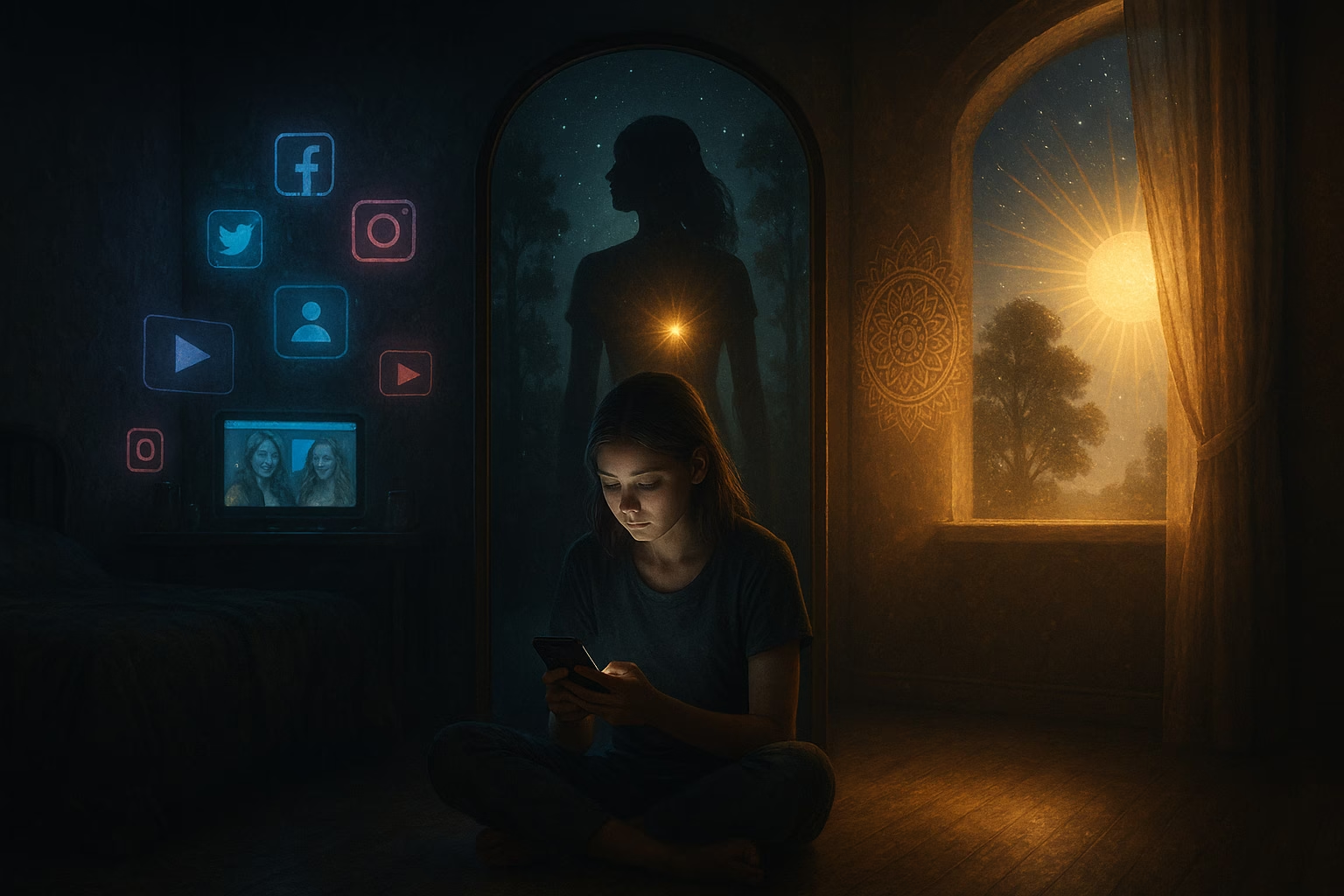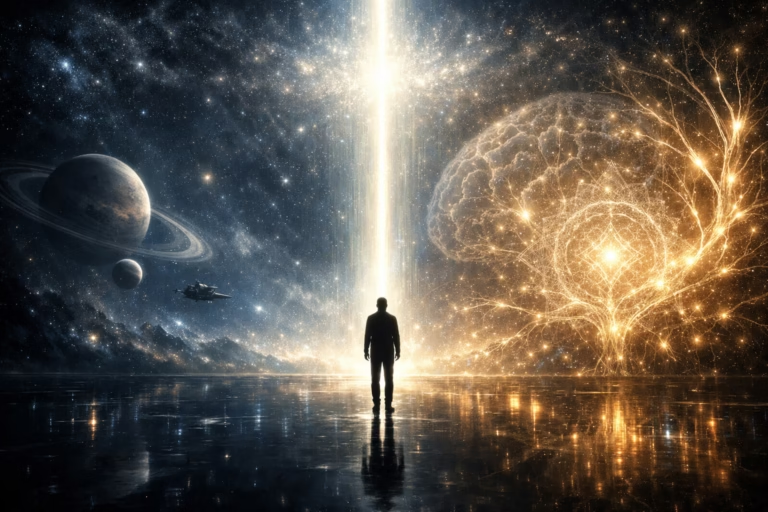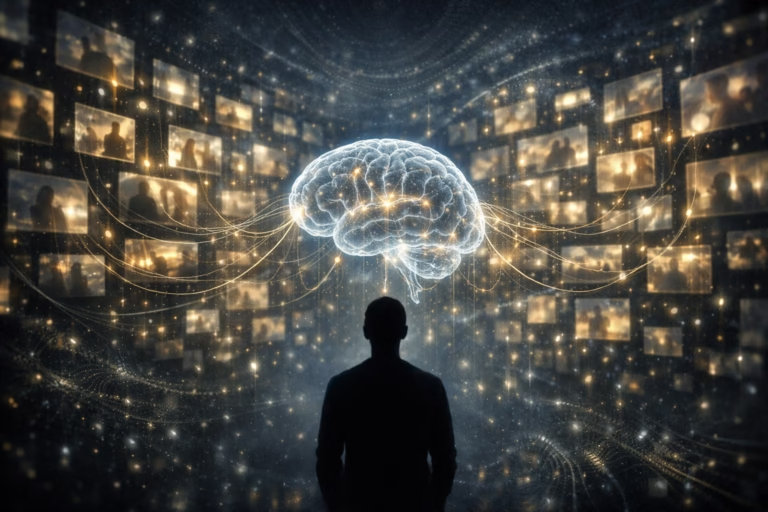PODCAST: From Celebrity Obsession to Self-Discovery
The Mirage of the Borrowed Life: An Epidemic of Upward Comparison
The sun has set, the day’s work is done, and the world has grown quiet. In the soft glow of a phone screen, a different world awakens. It is a universe of perfectly curated images: sun-drenched vacations, flawless bodies, and effortless success. As a finger scrolls, a quiet, internal whisper begins to rise: “My life isn’t enough.” This feeling of being “less than” is the starting point of an inner journey, one that reflects a deeper, societal malaise. The obsession with celebrity and influencer culture, fueled by social media, is not merely a harmless pastime. It is a complex psychological and spiritual phenomenon that thrives on a specific human vulnerability, and its hidden costs are far greater than they appear. This report examines the mechanics of this modern obsession, its hidden costs, and offers a path back to self-discovery, inspired by the philosophical teachings of Fractal – The Trilogy and The Oracle 2.0.
At the heart of this phenomenon lies the psychological theory of social comparison, a natural human tendency to evaluate one’s own social and personal worth based on how one measures up against others. On social media, this tendency is amplified and weaponized through “upward social comparison”. This occurs when individuals compare themselves to others they perceive as being “better off” in some way, whether in terms of wealth, appearance, or success. A constant stream of idealized and carefully curated images from influencers and celebrities creates a powerful and often subconscious comparison trap. These are not authentic, unfiltered depictions of life, but rather misleadingly positive portrayals designed for attention. The psychological toll of this constant upward glance is significant, leading to lower self-esteem and self-evaluation, and has been linked to a variety of negative mental and emotional outcomes, including depression, anxiety, and poor body image.
This dynamic creates a feedback loop akin to an addiction. Social media use can trigger a psychological craving and release of dopamine, the same “reward” chemical associated with gambling or drug use. Individuals may turn to social media to relieve feelings of loneliness or boredom, seeking a sense of connection or validation. However, rather than alleviating these feelings, heavy social media use can often exacerbate them, worsening symptoms of depression and loneliness. This cycle of seeking external validation to fill an internal void is the engine of a “borrowed life,” where one becomes a passive observer of another’s story rather than the active author of their own. The research on passive social media use, in particular, highlights this dynamic, as it is more likely to increase feelings of loneliness and dissatisfaction compared to active engagement. This behavior is a form of existential avoidance, a way to surrender one’s own narrative to another’s in order to avoid the difficult but necessary inner work of self-authorship and confronting one’s own life journey.
The paradox of modern society is that while we are more digitally interconnected than at any other point in history, many individuals feel a growing sense of loneliness and isolation. Studies have consistently shown a link between heavy social media use and an increased risk of loneliness and a lower sense of self. This is not simply a lack of social interaction, but a lack of meaningful interaction. Social media often replaces deep, authentic connections with a superficial sense of community, leading to a state of self-absorption and distance from real-life relationships. The celebrity and influencer media landscape thrives in this disconnected state by offering a constant stream of engagement that feels intimate but is ultimately one-sided and inauthentic. This creates a vacuum where the illusion of connection masks a deeper, spiritual disconnection from oneself and from others.
Table 1 visually represents the relationship between specific social media behaviors, their documented psychological impacts, and the philosophical vices they embody.
Behavior on Social Media | Documented Psychological Impact | Philosophical Vice (from The Oracle 2.0) |
|---|---|---|
Scrolling through curated feeds | Lowers self-esteem, triggers social comparison and envy | Envy: The illusion that others’ success diminishes you |
Creating a “false life” for likes | Causes a loss of authenticity, anxiety, and a feeling of unreality | Vanity: Obsession with external validation |
Passive consumption | Linked to increased loneliness, dissatisfaction, and depression | Living a “Borrowed Life,” disconnection from self |
Seeking validation via likes/followers | Creates a psychological craving and addiction-like loop | Vanity: Belief that worth is externally defined |
Comparing oneself to a celebrity’s life | Leads to feelings of inadequacy, guilt, and despair | Envy: Comparison based on an illusion of scarcity |
The Inner War for Your Soul: The Roots of Idolization
The external world of celebrity worship is a mere reflection of a more profound inner conflict. As illuminated in The Oracle 2.0, the human experience is an inner war between the ego and the soul. The ego, rooted in fear, seeks permanence, control, and validation, while the soul, rooted in love, seeks alignment, presence, and surrender to the flow of becoming. The vices of vanity and envy are not inherent flaws; they are the ego’s primary weapons in this war, crude attempts to meet a deep spiritual need through external means.
Vanity, in this context, is far more than a superficial concern with appearance. It is the obsession with external validation. The ego, believing that its worth is not intrinsic, seeks to prove its value through the attention, praise, and admiration of others. This creates a life lived for approval, an anxious performance of a false life that can make real-life struggles seem even more difficult. This constant need for external validation leads to a profound loss of authenticity and a crippling fear of being seen for who one “really is”. Ultimately, vanity is a form of spiritual separation from others and the source , as it alienates the individual from their own true self and creates a dependency on a fickle external world.
Envy is the ego’s insidious lie that there is a limited supply of success, happiness, or love in the world, and that others’ success diminishes you. This belief in a zero-sum game of life fuels a constant state of comparison and dissatisfaction. The research on social comparison theory highlights this, showing that frequent comparisons are linked to feelings of envy, guilt, and defensiveness. The academic literature also differentiates between malicious envy, which leads to resentment, and benign envy, which may motivate self-improvement. While benign envy might be perceived as productive, it is still rooted in the fundamental illusion of scarcity. The philosophical perspective, however, encourages a movement beyond this duality to a state of being where another’s light is not a threat, but a reflection of a shared, universal abundance. This is the ultimate challenge of the inner war: to transcend the mind’s illusions and operate from a place of unconditional love and unity.
The journey to overcome these vices is the essence of the human Hero’s Journey. It is an internal quest, not to conquer the world, but to confront one’s own inner demons. Elias’s narrative in Fractal – The Awakening serves as a powerful metaphor for this struggle. His journey to Mount Kailash is not merely a physical expedition; it is a spiritual ascent where he must face the shadow within himself and his own hunger for immortality. This is the ego’s ultimate desire: to escape the fractal and control reality, thereby freeing itself from the impermanence of form. Elias’s triumph is not in mastering the mountain, but in realizing that true power is not control, but alignment and remembrance. The pain of vanity and envy, therefore, is not a sign of failure but a powerful invitation to awaken. It is the soul’s signal that it is time to shift from the frantic search for validation in the outer world to the quiet sanctuary of self-discovery within.
Reclaiming Your Sovereignty: The Path of Remembrance
The path from idolization to self-discovery is not one of escape, but of return. It requires a fundamental shift from a mindset rooted in external validation to one grounded in internal worth. This process of remembrance involves cultivating key virtues that serve as powerful antidotes to the vices of vanity and envy, and practical actions that rewire the mind’s conditioning.
The first and most foundational antidote to the hunger for external validation is the cultivation of self-respect. This is not arrogance, but a deep, quiet knowing of one’s inherent value that does not require external proof. As described in The Oracle 2.0, self-respect is the foundation of all healthy relationships because it allows an individual to set clear boundaries and honor their own needs without shame. To build this inner citadel of self-respect, one must practice loyalty to the self: listening to one’s own inner voice, honoring one’s needs, and practicing self-compassion. This deliberate self-care builds an internal world that is stable and does not require a constant, precarious supply of external praise to feel whole.
The antidote to the illusion of scarcity and envy is the practice of gratitude. Gratitude is not a passive emotion; it is an active, transformative practice that serves as a gateway to abundance. By consciously focusing on what one has rather than what is perceived to be missing, an individual shifts their perspective from a mindset of lack to one of fullness. Research on social comparison supports this, suggesting that practicing gratitude, such as making daily lists or journaling, can help keep negative comparisons at bay. This practice is a direct application of the principle that the mind believes what it repeats. By consistently affirming a reality of abundance, one can reprogram the neural pathways that lead to envy and dissatisfaction, thus changing the psychological narrative from one of scarcity to one of plenitude.
The culmination of this inner work is a profound shift from a state of constant comparison to a state of genuine celebration. Instead of viewing another’s success as a personal threat, the awakened individual sees it as a reflection of a universal light that lives within all beings. The act of celebrating another’s light becomes an act of celebrating one’s own potential, acknowledging the interconnectedness of all existence. The journey of self-discovery is about actively authoring one’s own myth , rather than passively living a borrowed one. It requires intentional choices, such as limiting social media use, becoming aware of comparison triggers, and refocusing one’s energy on cultivating a life that is so deeply felt and aligned that it no longer requires validation from others. Ultimately, the goal is to shift from comparing oneself to others to comparing you with you , tracking personal growth and celebrating the unique, unfolding story of one’s own life.
Table 2 provides a comprehensive overview of the vices and their virtuous antidotes, connecting philosophical concepts with actionable practices.
Vice (The Ego’s Lie) | Underlying Belief | Virtuous Antidote (The Soul’s Truth) | Practical Application (The Path of Action) |
|---|---|---|---|
Vanity: Obsession with external validation | My worth is not inherent; it must be earned through approval | Self-Respect: My worth is intrinsic and non-negotiable | Set clear boundaries, practice self-compassion, and honor your own needs |
Envy: Others’ success diminishes me | There is a limited supply of success and happiness | Gratitude: Abundance is everywhere, and there is enough for all | Keep a gratitude journal, celebrate others’ wins, and consciously repeat affirmations of abundance |
Idolization: Living a borrowed life | I am a spectator in my own life’s story | Self-Authorship: I am the creator of my own myth | Limit passive social media use, identify and disengage from comparison triggers |
The Bell of Awakening: An Invitation to an Embodied Life
The journey from celebrity obsession to self-discovery is ultimately a return to the self, a sacred descent into the architecture of one’s own being. It is an acknowledgment that the problem lies not in the world’s abundance of light, but in our belief that we must borrow it from others. The feeling of “less than” is not a sign of our lack, but a signal from our soul, a bell tolling for a new renaissance.
This is the call of Elias’s journey from Fractal – The Awakening. He did not seek to escape the world’s chaos, but to return to it with a newfound presence and clarity. His enlightenment on the mountain was not a departure from reality, but a recognition of his place within it—as a conscious participant, not a passive observer. His return to a shattered world was not a mission to fix it, but to embody the change. He became a “gardener,” planting seeds of truth and courage in a world starving for wisdom.
The final conclusion is this: our true worth is not a borrowed light from a celebrity or a meticulously curated feed. Our worth is the sovereign, unique light we were always meant to be. The journey is not to find this light, but to honor it, to cultivate it, and to live it fully. Just as the bells of Budapest guided Elias’s path of remembrance, our own awakening is a signal. The bell has tolled, and with it, the window to a new future—a future of inherent worth, self-respect, and conscious celebration—has opened. It begins with one person choosing to listen, to honor their own light, and to become a gardener of the world they wish to see.
Bibliografia
- Social Media Comparison and Teen Mental Health – Newport Academy, https://www.newportacademy.com/resources/empowering-teens/theory-of-social-comparison/
- The Role of Envy in Linking Active and Passive Social Media use to Memory Functioning, https://pmc.ncbi.nlm.nih.gov/articles/PMC8993128/
- Understanding social comparison on social media – The Jed Foundation, https://jedfoundation.org/resource/understanding-social-comparison-on-social-media/
- Social Media and Mental Health: Social Media Addiction – HelpGuide.org, https://www.helpguide.org/mental-health/wellbeing/social-media-and-mental-health
- Study Links Both Active and Passive Use of Social Media to Rising Loneliness. Passive social media use – like browsing without interaction – predictably led to heightened loneliness, active use – which involved posting and engaging with others – also was linked to increased feelings of loneliness. : r/psychology – Reddit, https://www.reddit.com/r/psychology/comments/1im8i3s/study_links_both_active_and_passive_use_of_social/
- Envy on social media: The good, the bad and the ugly – ResearchGate, https://www.researchgate.net/publication/346410539_Envy_on_social_media_The_good_the_bad_and_the_ugl




